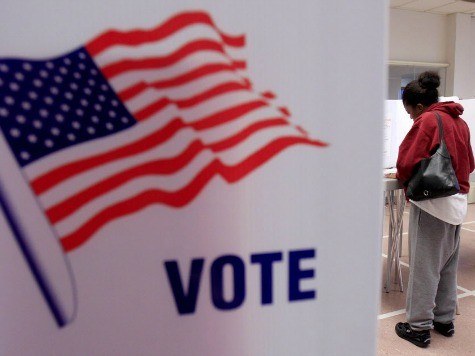Judicial Watch continues to push forward with its 2012 Election Integrity Project. JW is active in states across the country in helping to make certain that voter registration lists are accurate, in accordance with the rule of law. And this effort has already paid dividends.
Lincoln County, West Virginia, for example, immediately initiated an effort to clean up its lists following a warning letter from JW.
Judicial Watch also prompted the State of Florida to clean up its voter registration lists, and now is in court to try to help the state beat back a challenge from the Obama Justice Department, which has objected to this critical election integrity initiative. Now the state has been granted access to a federal database to help clean its voter lists of ineligible non-citizens, including illegal aliens.
And following up on a lawsuit against the state of Indiana over its dirty voter registration lists, Judicial Watch, in partnership with True the Vote, sued election officials in Ohio as well. And this lawsuit’s increased pressure forced Ohio Secretary of State John Husted to take action.
As reported by the Columbus Dispatch on September 16, 2012:
In a Feb. 10 letter, he asked U.S. Attorney General Eric Holder for a personal meeting to discuss how to balance seemingly conflicting federal laws so he could pare Ohio’s dirty voter list without removing truly eligible voters.
“Common sense says that the odds of voter fraud increase the longer these ineligible voters are allowed to populate our rolls,” Husted said. “I simply cannot accept that.”
Holder’s office has never replied.
When contacted last week by The Dispatch about Husted’s letter, a U.S. Department of Justice spokesman who did not wish to be identified by name said, “The department declines comment.”
When asked to at least confirm whether anyone from Holder’s agency responded to Husted’s inquiry, the answer was, “No comment.”
“As Ohio’s chief elections official, it is my responsibility to ensure the votes of every eligible voter are counted and ensure the integrity and accuracy of the results,” Husted said when he mailed the letter. “This is a difficult task when federal regulations limit Ohio’s ability to remove ineligible names, thereby increasing the chance for voter fraud.”
The Dispatch notes that “Husted’s letter came just four days after he was questioned about Ohio’s bulging voter rolls by Judicial Watch…” Husted is wrong, by the way, about it being a “difficult” task to remove ineligible names. Many states and localities have little problem running programs to help maintain accurate voting lists.
Based upon an analysis of U.S. Census and other data, Judicial Watch found that the number of persons listed on voter registration rolls in three counties in the State of Ohio exceeded 100% of the total voting age population. (Judicial Watch also noted that 31 other Ohio counties with registration rolls that contain between 90% and 100% of total voting age population.) Typically, only 71% of eligible voters register to vote.
Ohio is not alone. According to a Judicial Watch investigation, voter rolls in the following states appear to contain the names of individuals who are ineligible to vote: Mississippi, Iowa, Indiana, Missouri, Texas, Ohio, Pennsylvania, West Virginia, Florida, Alabama, California, and Colorado.
A recent article in the New York Post makes the point that we’ve been telling the country: “Current voter-registration systems are flawed, with huge numbers of dead or disqualified voters still on the rolls. And, since voter-ID enforcement is poor, in many places a person can simply claim to be one of those people and vote in their name with no one the wiser.”
In short, dirty lists can equal dirty election results. And this cannot be tolerated, given the important role clean elections play in the proper functioning of our democracy. Again, the Columbus Dispatch: “In a close presidential election where every vote might count, which ones to count might become paramount on Election Day — and in possible legal battles afterward.”
It is typical that the Obama Justice Department has not only failed to offer guidance to state election officials concerning how to keep voter registration lists clean, but also actively attacks states that try to impose election integrity measures.
Speaking of legal battles over election fraud, the Pennsylvania Supreme Court issued what can perhaps best be called a “split decision” this week over the state’s voter ID law. (JW has been active in this fight, filing an amicus curiae brief with the state’s High Court defending the law.) The Pennsylvania Supreme Court refused to strike down the law, but sent it back to the Commonwealth court for review. While it appears that the High Court is prepared to authorize a voter ID law in some form, the lower court must ensure that eligible voters are not disenfranchised.
The good (potentially great) news is that a voter ID law in Pennsylvania seems a near-certainty. The bad news is that it might not be implemented in time for the 2012 elections.
Rest assured as we close in on Election Day 2012, Judicial Watch will continue to fight for free, fair and clean elections nationwide and oppose any attempt by the Obama campaign (or the Romney campaign, for that matter) to undermine election integrity.

COMMENTS
Please let us know if you're having issues with commenting.